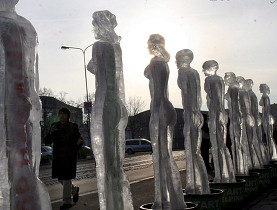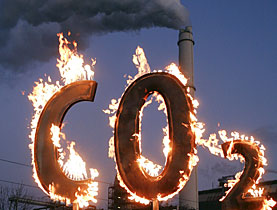Poznan talks “step on way to new climate regime”

The Swiss government says the climate talks in Poznan, Poland, which ended early on Saturday, made progress towards an agreement to replace the Kyoto Protocol.
In a statement, the environment ministry called the outcome an “intermediate step on the way to a new climate regime”.
The United Nations-sponsored conference in the Polish town ended with a working schedule designed to formulate a treaty which can be signed in Copenhagen a year from now.
The aim is to replace the Kyoto Protocol with a new deal that will come into force after 2012. It will include unprecedented measures for curbing emissions of greenhouse gases and helping poor countries, which are expected to bear the brunt of the effect of climate change.
Members of the UN Framework Convention on Climate Change (UNFCCC), including Switzerland, are expected to submit proposals for the treaty’s text in the first few months of 2009.
By June, these will be condensed from what is likely to be a massive document into a blueprint for negotiations.
Analysts say the year-long process will revolve around two big issues: who should make the biggest sacrifices on curbing harmful emissions, and how to beef up support for poor countries.
Ambitious
Switzerland has called the 2009 work schedule “ambitious”.
The environment ministry said the intermediate talks to take place next year would focus on the formulation of a joint vision for climate protection, global emissions targets, adaptation measures and the guarantee and extension of schemes to transfer technology and finance.
Industrial nations, including Switzerland, will be called on to announce their reduction targets for the time after 2012 as quickly as possible.
But negotiations next year could bog down over ways to make more efficient and credible the so-called “flexible mechanisms”. These enable industrial countries to achieve part of their climate targets by supporting emission reduction schemes in emerging and developing nations.
Another sticking point could be how to define the criteria by which carbon dioxide sinks from forestry and agriculture can be set off against a country’s greenhouse gas inventory.
On this point, Switzerland wants to receive credits for culling trees if the resulting wood products are put to use as building materials.
Adaptation agreement
UNFCCC delegates agreed in Poznan that the executive board of the Adaptation Fund to support developing countries deal with climate change could begin its work. Switzerland is a member of the board.
However, the delegates rejected a controversial motion put forward by developing countries which sought additional financing through the flexible mechanisms.
Many experts say the fund will need to be boosted by billions of dollars a year in the coming decades if poor countries are to adapt to an increase in extreme weather events such as flooding and droughts.
Switzerland also welcomed the consensus that was reached in Poznan to involve local populations and aboriginal peoples in the future climate regime, in order to guarantee sustainability.
Swiss Environment Minister Moritz Leuenberger, speaking in Poznan on Thursday, warned against postponing climate protection because of the financial crisis. On the contrary, there must be investment in climate protection now, he said.
swissinfo with agencies
Temperatures in Switzerland have risen by an average of 0.57 degrees Celsius each decade since 1970. The increase is twice as much as the average for the northern hemisphere.
Carbon dioxide is one of the major gases responsible for the greenhouse effect and global warming. In Switzerland it represents around 80% of harmful emissions. Other gases include methane, nitrous oxide and hydrocarbons.
Despite ambitious emission targets, greenhouse gas emissions have actually risen by 0.4% in Switzerland since 1990.
Kyoto, a 178-nation accord, is a 1997 annex to the 1992 UN climate treaty that requires 37 industrial nations to reduce greenhouse gas emissions by an average of five per cent below 1990 levels by 2010.
The Swiss parliament ratified the Kyoto Protocol on climate change in 2003. Switzerland undertook to reduce its CO2 emissions to ten per cent less than 1990 levels by 2010.
Despite ambitious emission targets, greenhouse gas emissions have actually risen by 0.4% in Switzerland since 1990.
A CO2 law came into force in 2000 to ensure that the Kyoto target was achieved. About a thousand enterprises have taken voluntary measures to reduce their emissions.
But it became clear by 2005 that these measures were not sufficient. It is proving difficult, however, to agree on how to strengthen them.

In compliance with the JTI standards
More: SWI swissinfo.ch certified by the Journalism Trust Initiative



You can find an overview of ongoing debates with our journalists here. Please join us!
If you want to start a conversation about a topic raised in this article or want to report factual errors, email us at english@swissinfo.ch.